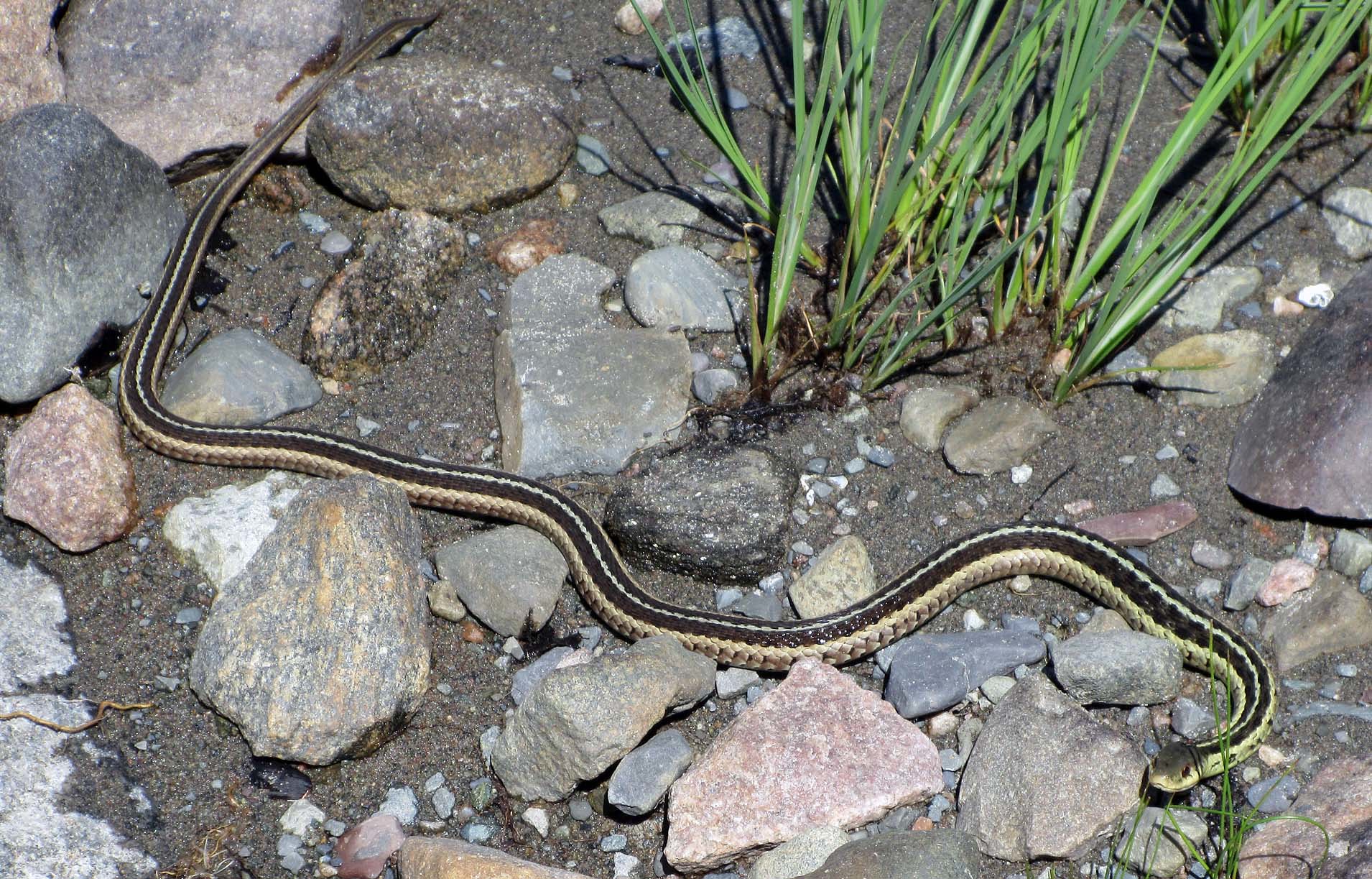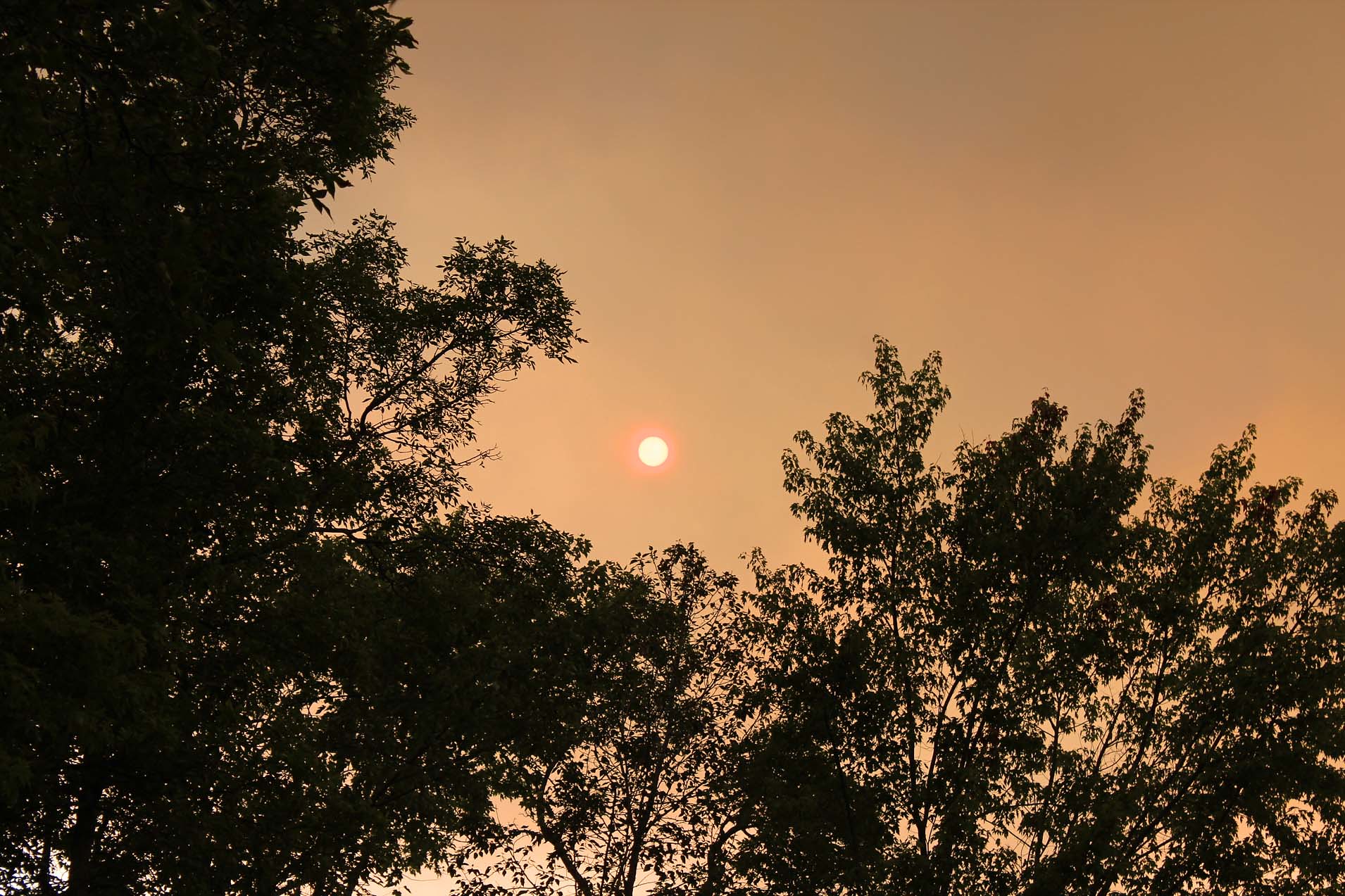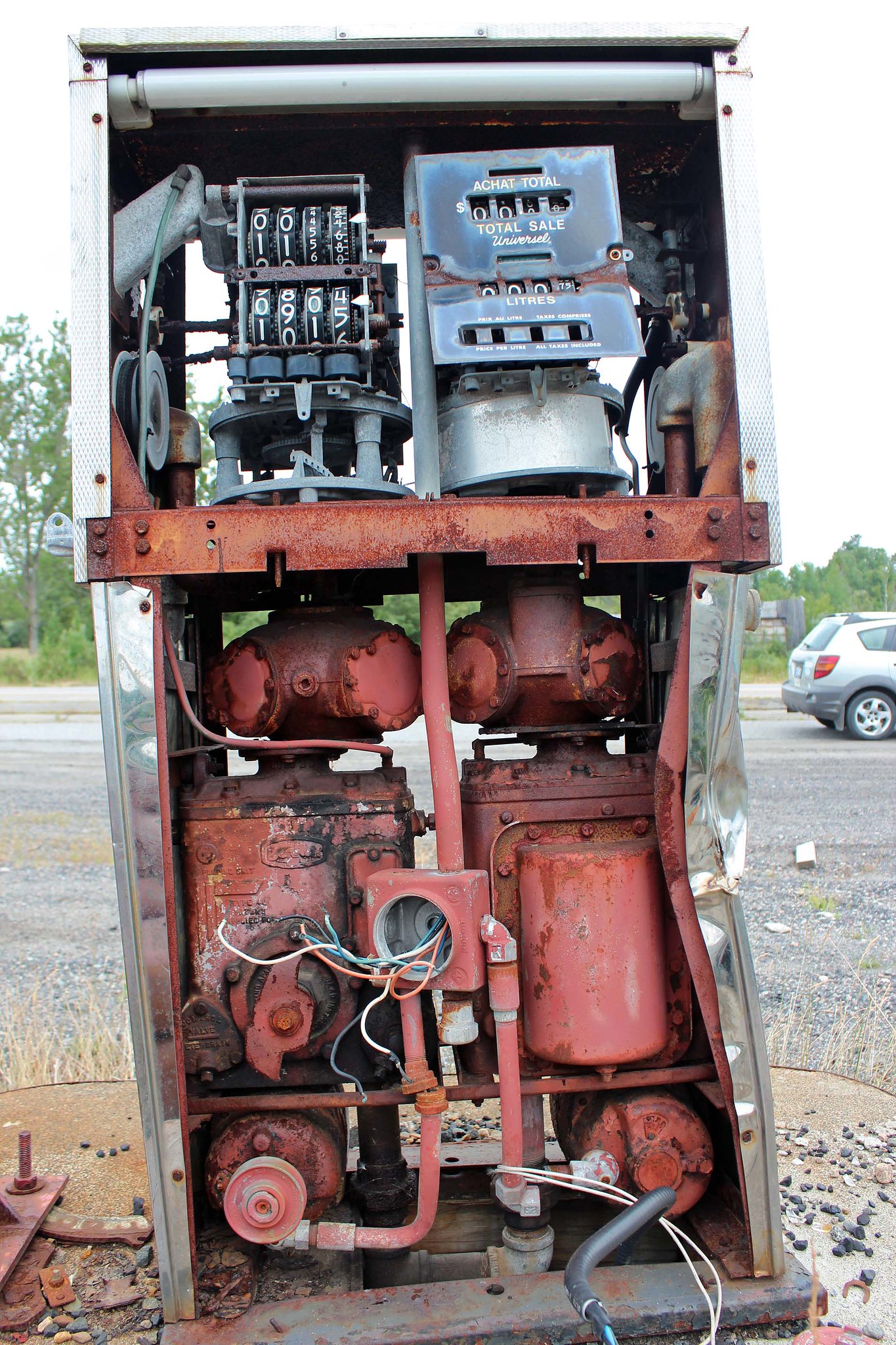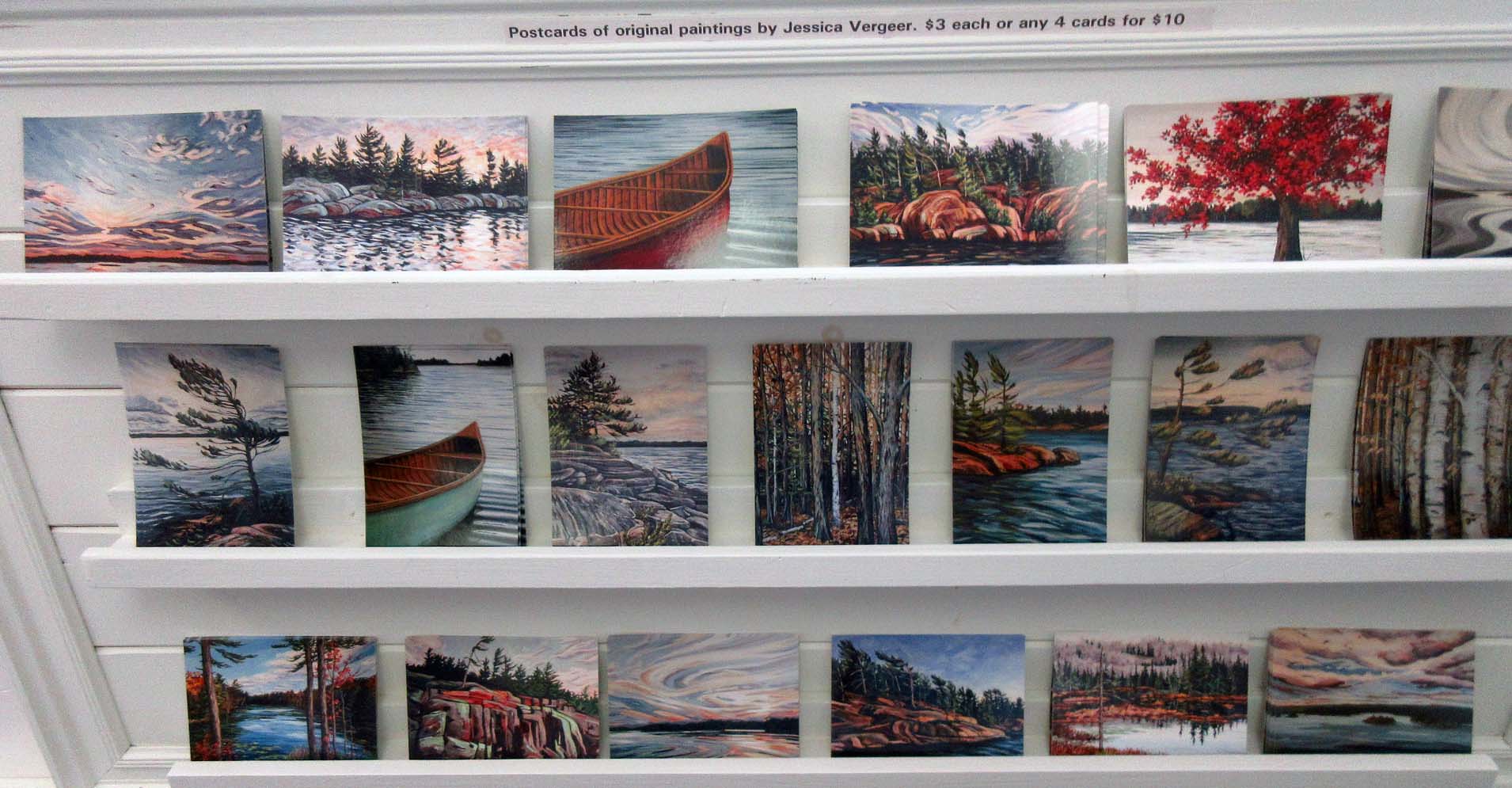I have always considered the
French River area to be one of the most beautiful places to go canoeing and
camping, so Chris and I were quite thrilled to it again. It was very hot and
sunny and we were aware of the fire ban—well, we had to forgo sitting around a
campfire in the evenings, but it was not the first (and last) time I had to
deal with fire bans.
 |
| Hartley Bay Marine, from where we commence most of our canoeing trip on the French River |
We left Hartley Bay around
4:00 pm and soon reached Wanapitei Bay and paddled towards its western shore.
The campsites along that shore appeared to be vacant, but we kept paddling
until we reached the ‘intersection’ of the Main & Western Channels. First,
we checked out campsite #617, where I had camped 9 years ago. It was nice,
offered a breathtaking view, but we could not find a good spot for the tents
(except on the small beach facing east—and I really like watching sunsets). Besides,
it was quite windy and we were incessantly attacked by horse flies. We saw
blueberries bushes with very few tiny, dry and bitter blueberries.
 |
| Our campsite #619. In the spring this whole area is under water |
We paddled to campsite #618
across the river, but it was occupied. So we continued paddling on the Western Channel
for several minutes until we arrived at campsite #619. The campsite was not
perfect, but since it was very humid, sunny and hot (over +30 C), Chris was
extremely reluctant to keep paddling any farther. The campsite faced west and
at least we could admire sunsets! It had nice rock formation and a fire pit
already full of wood. There was a spot for at least one tent near the fire pit,
but we decided to set up our tents on the small ‘beach’, farther down from the
fire pit. By the way, we could see that probably during the spring thaw the
width of the river increased by up to 10 meters—there were sandy deposits even
in the forest. Well, we hoped that during our trip the river was not going to
suddenly become as big as to flood our campsite—unless there was a huge
rainfall or the dam near Lake Nipissing burst!
 |
| View from our campsite-sunset |
Although we were not aware of
any issues with pesky bears this summer, we still decided to hang our food. The
problem was finding the right tree in the forest, not an easy task considering
swarms of voracious horse/deer flies and mosquitos. Supposedly the food should
be hanging over 30 meters from the tents; in our case, after almost one hour,
we managed to hang the barrel with the food and the cooler about… 3 meters from
the tents. I guess it’s still better than NOT hanging it at all… By the way, I
again appreciated the bear-proof bins installed on some campsites in the
Massasauga Provincial Park—I wish all parks had such bins.
 |
| Part of our campsite and a fire pit-unfortunately, we were unable to use it |
The campsite had several rock
formations, which were perfect for sitting or relaxing. However, it was quite
exposed and it was difficult to find shade—we had to keep relocating our chairs
all the time. Another issue was boat traffic—not far from us was Atwood Lodge
(on Atwood Island) as well as other cottages, so plenty of motorboats
(including, on a couple of occasions, a barge carrying construction equipment
and building materials) were passing by all day. From time to time we saw
canoes and kayaks too. At night we could sometimes hear trains’ whistles.
 |
| The pike made a tasty supper |
It was our intention to do as
much fishing as possible, but the hot, sunny & humid weather prevented us
from paddling during the day, it would have been too arduous. So we ended up
spending most of the time sitting at the campsite, relaxing, talking and
reading books. Fishing from the campsite during the day did not bring any
results. A couple of times we took the canoe for an evening paddle around
Atwood Island and nearby bays. In no time we caught several pikes—some of them
we had to release due to the size limits (we were not permitted to keep those
between 53 and 86 cm in size).
 |
| The fish is being cooked... and the white dots are mosquitos, swarms of them, it was just unbelievable! |
Unfortunately, when we
brought the fish to our campsite to clean & fry, we encountered another
problem: MOSQUITOES! They became very active after 8:00 pm and while Chris was
cleaning the fish, I had to wave a towel to chase them off, but due to their
huge numbers, it didn’t do much good. But the worst was yet to come: when I was
frying the fish (on my propane stove, of course), a huge, dense CLOUD of
mosquitos appeared and they were all over me and the frying pan, it was
absolutely horrendous! Even though I did spray myself with a DEET-based insect
repellent, it did not help much: while the mosquitoes were not biting me, they
were getting into my eyes, ears and mouth. As soon as the fish was ready, we
hastily ate it, with our headlamps on, standing close to the shore and still
being attacked by multitudes of hungry mosquitoes. I’ve been camping for tens
of years and it was the second time I encountered so many mosquitos. We quickly
went to our tents and could hear the continuous buzzing outside for at least
another hour. We decided to skip fishing in the evenings—even if we caught any
fish, it was impossible to clean & eat them. One night we were fishing from
our campsite and apparently caught a catfish—but it must have been very big
because the 35 lb. fishing line snapped.
 |
| Garter snake was trying go catch a frog |
Regarding horse flies, I
found a perfect solution to get rid of them. Namely, I taped a sticky patch
(from Canadian Tire) to the top of my hat. Because horse flies are somehow
compelled to sit on the top of one’s head, the patch made the perfect landing
strip… and once they sat on it, they stayed there… forever! Without
exaggeration, this method eliminated 95%+ of flies
Because most of the
time we just sat at the campsite, I managed to read a wonderful, yet very depressing
book, „A Fine Balance” by Rohinton Mistry. Most likely the book and its
characters will stay in my memory for a long time. It is a masterpiece—but at
the same time the story is so horribly sad that at times I wondered if the plot
took part in India in the 1970s or during the German occupation of Poland
during the Second World War (round-ups, forced labour, forced sterilization). In
spite of everything, I recommend it to everyone.
We didn’t see or notice any
bigger animals on our campsite, not even a squirrel. Once I found a garter
snake near my tent’s entrance—I gently grabbed it and moved to the forest. The
next day my friend saw another garter snake, much bigger, near the water. As we
were watching, it suddenly jumped towards a small frog, but it escaped. We also
saw several birds circling above our campsite. It was mainly turkey vultures,
looking for carrion. While fishing, we spotted several blue herons and loved
observing them majestically taking off, flying and landing. On one occasion I saw
a falcon and a blue jay. And we often heard invisible woodpeckers in the
forest.
 |
| Smoke coming from the nearby forest fire |
On the sixth day the weather
became somehow peculiar—layers of darker clouds moved in, but it did not rain
and we could still see regular clouds behind them. Soon, we noticed—and later
smelled—patches of smoke. Obviously, there was a fire going on somewhere! The
sun, shrouded by the smoke, appeared unusually red.
 |
| The sky was full of smoke coming from the forest fire |
The next day the sky looked
similar, leaden and full of smoke. We thought that the fire was very far from
us and we were even planning to go fishing later afternoon as the sun was much
less intense. Then before noon a park boat arrived at our campsite with an
assistant superintendent (the same one that we had met 3 years ago, in 2015)
and another park employee. We were told that a major fire had been raging in
the Key River area for two days and that there was mandatory evacuation of all
campers, cottagers and visitors, so we had to immediately pack up and head to
Hartley Bay Marina.
 |
| The sun, shrouded by the smoke, appeared unusually red |
Within one hour we were on
the water. From Wanapitei Bay we could see the smoke in the south. There was a
chopper flying above us. Soon we noticed many other kayaks, canoes and
motorboats, all proceeding towards the marina. The park boat once again
approached our canoe and the warden took down our campsite permit number, to
keep record of those campers who were safely leaving the area.
 |
| The local firefighters near Hartley Bay Marina |
Once we reached Hartley Bay
Marina, we quickly packed the car, put the canoe on the car and left the
loading area to let other people use it—and indeed, it was a very busy place,
teeming with campers and boaters forced to cut short their vacation! At the
entrance to the marina we were stopped by local firefighters who asked us to
write down our names—that we had safely left. While driving on Hartley Bay road,
the smoke was getting more visible. There was a police cruiser at the end of
the road, making sure nobody was going back towards Georgian Bay.
 |
| At Grundy Lake Provincial Park-a fire ban notice. All campers followed this fire ban |
The fire, called “Parry Sound
33”, which began on July 18, 2018, turned out to be one of the major fires in
Ontario, scorching 11,362.5 hectares. It was officially declared to be
extinguished on October 31, 2018!
 |
| Our campsite #127 at Grundy Lake Provincial Park |
Out of my approximately 15
camping & canoeing trips on the French River, this one was the least
successful due to the sweltering weather, fire ban, clouds of mosquitos and
finally the evacuation that cut our vacation short. Of course, such
inconveniences did not change my opinion on the French River—it was still my
favorite place to come camping and canoeing! Well, it was another adventure and
I’m looking forward to visiting this outstanding park again and again in the
future.
 |
| Abandoned gas station and a service station in Still River, near highway 60 |
As we were driving to Grundy
Lake Provincial Park on highway 69, the smoke became much thicker; it was like
driving in a dense fog. All cars slowed down and had their lights on. Luckily,
Grundy Lake Park was still open and there were some sites available. We stayed
on campsite #127 for two nights. It was a nice, average site. The smoke from
the fires had not reached the park, so at least we could breathe easier and I
aired out my car which reeked of smoke.
 |
| Still River. Abandoned gas station |
The park was pretty full and
there were many families with kids. Of course, there had been fire ban in the
park for some time and I was told by the park staff that it had been
religiously observed by all campers. The park offered various
children/family-related activities and had a naturalist center open.
The park had several lakes
(no motorboats were allowed), but we did not canoe on them. According to the
park tabloid, there were a number of paddle-in campsites for those who would
like to experience more seclusion, peacefulness and wilderness.
 |
| I even found this black telephone at the abandoned gas station in Still River! In September, 2018, we stopped there and Catherine tried to make a phone call, using this very device (https://live.staticflickr.com/3001/2871020765_c26f01467b_h.jpg)! |
Just vis-à-vis the park
entrance was the new location of Grundy Lake Supply Post (relocated from the
intersection of road 522 and highway 69). It sold gas, various camping/fishing
supplies, basic groceries, ice cream, hamburgers as well as rented canoes,
delivering them directly to the park. It was here that we had purchased our
canoe in 2010!
By the way, 4 days after our
departure the whole park was evacuated and 800 campers had to immediately leave
it due to smoke coming from the “Parry Sound 33” fire.
 |
| At the Hungry Bear Restaurant |
The next day (Sunday) we went
for breakfast to the Hungry Bear Restaurant—just the previous day the place was
encompassed by smoke coming from the fire—but fortunately, the wind had changed
its direction overnight and the sky was perfectly blue.
We had an omelet and a 3-egg
breakfast with coffee (free refills), it was very tasty and exactly what we
needed after one week of canoeing & camping on the French River. On my way
to the adjacent Trading Post I met Hungry Bear & Blueberry Hound who just
emerged from their den and were very happy to shake hands and pose for photos!
 |
| Still Riven-an old gas tank |
After breakfast we drove
south on highway 69 to a town of Still River. On the east side of the highway
we could still see the semi-ruins of a truck stop. I had spotted this building
in September, 2008, while coming back from our fantastic canoe trip on the
French River. Catherine and I had spent there about 30 minutes, exploring the
buildings and taking photos of the gas dispensers and the existing structures.
There had been a rotary phone which Catherine had tried using; whereas unable
to talk to anybody, it had made a great prop for photographs! Then over the
following 10 years I passed this truck stop on numerous occasions and each time
part of it was missing or destroyed by humans or elements—and people kept
dumping more junk around this place. So, it was almost exactly 10 years later
that I, along with Chris, re-visited this place. Indeed, it was quite junky—now
there were old boats, cars, a school bus and a myriad of other junk—among them,
the black rotary phone! Part of the building was missing—yet when I entered the
still standing building (it was not locked), I was surprised to see plenty of
relatively new stuff, including some power tools. It appeared that somebody had
set up a workshop there and was still using it. I was a little concerned that
this place was open—after all, nobody else was around and for thieves it would
have taken just minutes to grab the most valuable stuff and take off. There was
a police station nearby and I wanted to report this fact, but of course, there
was nobody inside. We took numerous photos of this place and then drove just
across the highway, to an abandoned restaurant and motel.
 |
| Welcome to Long Branch Hotel. Dining Lounge. Truckers Welcome |
There was a big,
faded sign that said, “Welcome to Long Branch Hotel. Dining Lounge. Truckers
Welcome”. Alas, it must have been a very long time since the place saw any
guests! We carefully entered the former restaurant/lounge. Part of the floor
had caved in. There were some old furniture and some had stickers with prices—I
think that before the place went under, there was an auction and whatever was
not sold, still remained. The second building, the hotel, was also in a very
bad shape. The main hall’s floor totally caved in. The rooms contained some
broken furniture, toilets and drywall. All the windows were broken and the
glass was everywhere—as well as graffiti adorned both buildings. It was obvious
that vandals had been here at work for a long time; again, it is one of those
things I could never understand—wanton destruction of property! We carefully
walked around the buildings and saw some covers on the ground—perhaps the gas
tanks were still buried underground, as there was a smell of gas. While we were
exploring the hotel, a couple arrived and also embarked on a tour of the
restaurant.
 |
| I think it was part of the restaurant |
“If you’re planning to stay
here overnight, there’re plenty of vacant rooms in the other building”, I told
them. Well, one would have to be really desperate to take shelter there!
 |
| A hotel room, with a private bathroom! |
Having spent two nights in
the park, we packed up and headed home, stopping in Parry Sound. First of all,
we went to Hart’s and No Frills, where we purchased a few food items and drove
to the Sequin River, where traditionally under the train trestle we had lunch.
Later we walked back to town and went to the new location of the Bearly Used
Books bookstore. Now it was on the main street, in the same building that
members of the federal and provincial parliament had their constituency
offices. The place was huge, but in no time I found my way among the thousands
upon thousands of books and soon felt like at home—or rather, like at the old
location! As always, the staff was very nice and knowledgeable, quickly
pointing me to the right area. Unfortunately, this time I was unable to spend
too much time in the store, but still managed to buy three very interesting
books.
 |
Inside Jessica Vergeer's Studio. Vintage-style posters of Parry Sound, Wreck Island, Killbear Provincial Park and the Lighthouses at Snug Harbour and Red Rock. |
Just vis-à-vis the bookstore,
across the street, was Jessica Vergeer’s Studio. About a year ago I had seen
some of Jessica Vergeer works online and I was finally able to visit her store.
Indeed, the paintings were awesome and I could appreciate them even more
because I had canoed & camped on Georgian Bay for years and had personally
seen—or rather experienced—the one-of-a-kind scenery depicted in them. She is a
very gifted artist!
 |
| Postcards of original paintings by Jessica Vergeer |
I bought several postcards of
original paintings by Jessica Vergeer as well as vintage-style posters of Parry
Sound, Wreck Island, Killbear Provincial Park and the Lighthouses at Snug
Harbour and Red Rock. Since I had visited most of these places by canoe and/or
camped there, the pictures brought back plenty of wonderful memories!
Even though we were not able
to spend a lot of time in Parry Sound, I truly enjoyed our visit there.























very useful information for me.
ReplyDelete